
NEW GERMAN CRITIQUE
Scope & Guideline
Navigating the Complexities of Identity and Memory
Introduction
Aims and Scopes
- Critical Theory and Philosophy:
The journal extensively engages with critical theory, particularly the works of influential philosophers such as Adorno, Habermas, and Benjamin, analyzing their impact on contemporary thought and cultural criticism. - Literary Studies and Cultural Critique:
'New German Critique' focuses on literary analysis and cultural critique, examining texts from both historical and modern perspectives, often through the lens of social and political contexts. - Interdisciplinary Approaches:
The journal promotes interdisciplinary scholarship, integrating insights from fields such as film studies, media studies, and memory studies to enrich discussions around German literature and culture. - Reevaluation of Historical Narratives:
There is a consistent emphasis on reexamining historical narratives, particularly concerning the Weimar Republic, Nazism, and post-war Germany, aiming to uncover overlooked voices and perspectives. - Memory and Trauma Studies:
The journal addresses themes of memory, trauma, and identity, particularly in relation to Jewish experiences during and after the Holocaust, contributing to a broader understanding of cultural memory.
Trending and Emerging
- Queer Theory and Spectrality:
Emerging themes around queer theory and spectrality signify a growing interest in exploring identity, memory, and representation, challenging traditional narratives within German literature and culture. - Interdisciplinary Media Studies:
There is an increasing trend towards interdisciplinary approaches that incorporate media studies, examining the role of film, photography, and digital culture in shaping contemporary German identity and memory. - Decolonization in German Studies:
Recent papers reflect a rising focus on decolonization in German studies, addressing issues of race, identity, and the historical implications of colonialism within German literature and cultural production. - Environmental and Ecocritical Perspectives:
A notable trend is the inclusion of ecocritical perspectives, as scholars engage with environmental issues in relation to German literature and philosophy, indicating a broader awareness of ecological crises. - Intercultural Narratives:
The exploration of intercultural narratives is on the rise, as the journal seeks to understand the complexities of cultural exchange and the impact of globalization on German literature and identity.
Declining or Waning
- Traditional Historical Analysis:
While historical analysis remains important, there is a noticeable decline in purely historical papers without a critical or theoretical framework, indicating a shift towards more contemporary and theoretical approaches. - Focus on Classical Texts:
The journal seems to be moving away from an exclusive focus on classical German texts, as contemporary literature and media gain more attention in the discourse. - Strictly Nationalistic Perspectives:
There is a waning interest in discussions that center solely on German nationalism, with a growing emphasis on transnational and multicultural perspectives in German studies.
Similar Journals
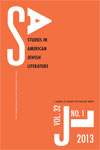
Studies in American Jewish Literature
Illuminating the Intersection of Culture and LiteratureStudies in American Jewish Literature, published by Penn State University Press, is a premier academic journal that delves into the rich tapestry of Jewish literary expression in America. With an ISSN of 0271-9274 and an E-ISSN of 1948-5077, this journal serves a vital role in the fields of Literature and Literary Theory, Cultural Studies, and Anthropology, as evidenced by its placement in the Q1 to Q3 quartiles across various categories in 2023. The journal is a key platform for researchers, professionals, and students interested in exploring the intersection of Jewish identity and American literature, contributing to a deeper understanding of cultural narratives and societal impacts. The publisher's commitment to scholarly excellence ensures that each issue is meticulously curated, showcasing innovative research and critical analysis. While not open access, the journal provides essential insights for anyone engaged in the study of Jewish literature or the broader cultural dynamics at play in American society. Stay informed on contemporary themes and historical contexts that shape literary discourse through this commendable publication.
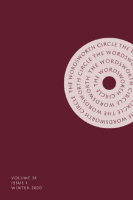
WORDSWORTH CIRCLE
Illuminating Literary Landscapes with Rigorous AnalysisWORDSWORTH CIRCLE, an esteemed journal published by University of Chicago Press, serves as a pivotal platform for scholars and enthusiasts in the fields of Cultural Studies and Literature and Literary Theory. With a firm foundation established from 2002 and expected to continue through 2024, the journal is recognized for its rigorous scholarship, evident in its prestigious ranking of Q1 in Literature and Literary Theory and Q2 in Cultural Studies for the year 2023. Although it is not an open-access journal, its valuable contributions to the discourse surrounding literary analysis and cultural critique make it a significant resource for researchers, students, and practitioners seeking to deepen their understanding of these dynamic fields. The journal's ISSN is 0043-8006, and it operates out of Chicago, IL, with its influence resonating across academic institutions and literary circles globally. By bridging historical perspectives and contemporary discussions, WORDSWORTH CIRCLE remains an essential publication for those dedicated to exploring the complexities of literature and culture.

LINKS Rivista di letteratura e cultura tedesca
Connecting Scholars to the Heart of German CultureLINKS Rivista di letteratura e cultura tedesca is a distinguished academic journal dedicated to the exploration and analysis of German literature and culture. Published by FABRIZIO SERRA EDITORE, this journal serves as a vital platform for researchers, professionals, and students who wish to delve into the intricacies of German cultural studies across various time periods and genres. With both ISSN 1594-5359 and E-ISSN 1724-1685, LINKS emphasizes scholarly rigor and multidisciplinary approaches, providing a space for innovative research and critical perspectives. Although the journal is not open access, it still plays a crucial role in advancing the understanding of German literature within the international academic community, contributing significantly to the field's ongoing dialogue and evolution. For those interested in enhancing their knowledge and engagement with contemporary issues in German studies, LINKS represents an essential resource.

COLLOQUIA GERMANICA
Advancing Scholarly Discourse in Germanic StudiesCOLLOQUIA GERMANICA, published by FRANCKE VERLAG, serves as a vital platform for the dissemination of scholarly research in the fields of linguistics, literature, and literary theory. With a rich history spanning from 2002 to 2017 and again from 2020 to 2024, this journal is indexed under ISSN 0010-1338 and is recognized within Q4 quartile rankings in both Linguistics and Language, and Literature and Literary Theory as of 2023. Although it operates primarily on a subscription basis, this journal endeavors to enhance academic discourse and promote innovative research that contributes to our understanding of Germanic languages and literature. Researchers and professionals can greatly benefit from the journal's content, given its position in Scopus with notable rankings and percentiles in various categories. COLLOQUIA GERMANICA invites submissions that offer fresh insights into the intricacies of language and literature, making it an essential read for academics and students alike.

SALMAGUNDI-A QUARTERLY OF THE HUMANITIES AND SOCIAL SCIENCES
Connecting Thoughtful Scholars Across the Arts and Social SciencesSALMAGUNDI: A Quarterly of the Humanities and Social Sciences is a distinguished journal dedicated to fostering critical discussions within the realms of humanities and social sciences. Published by SALMAGUNDI and housed at Skidmore College in Saratoga Springs, NY, this journal has been serving the academic community since its inception in 1987. Although it operates under a subscription model, its commitment to exploring diverse perspectives in cultural studies, literature, and the arts remains unwavering. With its current rankings placing it in the lower quartiles of its categories in Cultural Studies, Literature, and Visual Arts, SALMAGUNDI presents a platform for emerging ideas and underrepresented voices that challenge conventional narratives. As the journal charts its course towards the year 2024, it continues to invite scholars, professionals, and students to engage with its rich content, fostering a collaborative environment of intellectual growth and inquiry.
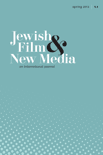
Jewish Film & New Media-An International Journal
Illuminating Jewish Identity Through Film and Media NarrativesJewish Film & New Media: An International Journal, published by Wayne State University Press, serves as a crucial platform for scholars and practitioners within the realms of Film Studies, Jewish Studies, and Media Studies. Since its inception, the journal has explored the intersection between Jewish culture and cinematic representation while also addressing contemporary media narratives. With an ISSN of 2169-0324 and E-ISSN 2169-0332, it is indexed in major databases, showcasing solid rankings in various disciplines, including a commendable Q2 rank in Visual Arts and Performing Arts. Despite its current Q4 categorizations in Anthropology and Communication, the journal is noted for its engaging contributions that sow rich discussions about Jewish identity, filmic expression, and media representation. Researchers and students alike benefit from the journal’s wealth of interdisciplinary scholarship, which spans converged years from 2013 to 2017 and 2019 to 2022, ensuring a robust timeline of critical inquiry. As an essential resource for understanding the nuances of Jewish film and new media, this journal occupies a unique niche, inviting contributions that push the boundaries of current academic dialogue.
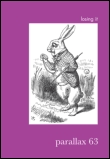
Parallax
Illuminating Perspectives in Cultural Studies and BeyondParallax is an esteemed scholarly journal published by Routledge Journals, Taylor & Francis Ltd, focusing on critical studies in Cultural Studies, Literature and Literary Theory, Philosophy, and Visual Arts and Performing Arts. Established in 1995 and operating from the United Kingdom, it has carved out a niche as a vital resource for researchers, professionals, and students alike, contributing notable insights and fostering discourse within these dynamic fields. With its rigorously peer-reviewed articles, Parallax enjoys a solid reputation, evidenced by its Q2 ranking in multiple categories in 2023 and impressive Scopus statistics that position it among the top percentile of its peers. The journal's commitment to interdisciplinary engagement invites scholars to explore the intersections of culture, art, and philosophy, making it an essential reference point for contemporary academic inquiry.

Nordisk Judaistik-Scandinavian Jewish Studies
Bridging Cultures: Unveiling Jewish Identity in ScandinaviaNordisk Judaistik-Scandinavian Jewish Studies is a distinguished academic journal dedicated to the exploration of Jewish culture, history, and religious practices in the Scandinavian context. Published by the DONNER INSTITUTE FOR RESEARCH ON RELIGIOUS AND CULTURAL HISTORY in Finland, this journal has been an open access platform since 2016, allowing easy dissemination of knowledge and fostering scholarly communication among researchers, educators, and students. With a variety of subjects encompassing Anthropology, Cultural Studies, History, and Religious Studies, the journal has achieved commendable recognition, with its latest rankings placing it in Q2 in several categories according to the 2023 Scopus rankings. The journal's significant contribution to the field is evident through its impact, evidenced by its strategic position within its respective quartiles. By bridging interdisciplinary methodologies and Jewish studies within a Scandinavian framework, Nordisk Judaistik serves as an essential resource for those engaged in the complexities and nuances of Jewish heritage and identity in the region.
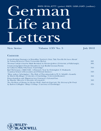
GERMAN LIFE AND LETTERS
Celebrating Eight Decades of German Literary ScholarshipGERMAN LIFE AND LETTERS, published by WILEY, is a distinguished academic journal that has been a vital resource in the fields of Literature, Cultural Studies, and Sociology since its inception in 1936. With an impressive history spanning over eight decades, the journal is currently indexed with an E-ISSN of 1468-0483 and continues to serve as a critical platform for scholarly discourse and research across its converged years, encompassing materials from 1936 to 2024. Although classified in the Q4 and Q3 quartiles for various categories, its contributions significantly enrich our understanding of German literature and culture. Researchers, professionals, and students will find in this journal a captivating repository of insights, fostering a deeper appreciation for the interconnections between literature and socio-political themes. Unfortunately, it does not offer open access, but its wealth of knowledge and rigorous academic standards make it an essential read for those engaged in these disciplines.
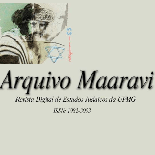
Arquivo Maaravi-Revista Digital de Estudos Judaicos da UFMG
Connecting Scholars in Jewish StudiesArquivo Maaravi-Revista Digital de Estudos Judaicos da UFMG is a distinguished open-access journal dedicated to the field of Jewish Studies, published by the Universidade Federal de Minas Gerais (UFMG). With an ISSN of 1982-3053, the journal has been serving the academic community since 2007, facilitating the dissemination of research and scholarship in Jewish cultural, historical, and religious studies. Situated in the vibrant academic landscape of Brazil, the journal aims to foster dialogue among researchers, professionals, and students, providing a platform for innovative and critical perspectives. Although the H-Index and specific Scopus ranks are not available, the journal's commitment to academic rigor and open access ensures that its content reaches a broad audience, empowering researchers and enriching the field of Jewish studies worldwide. The journal is based at FAC Ciências Econômicas, Av. Antonio Carlos, 6627, Belo Horizonte MG 31270-901, Brazil, making it an integral part of the UFMG's academic ecosystem.